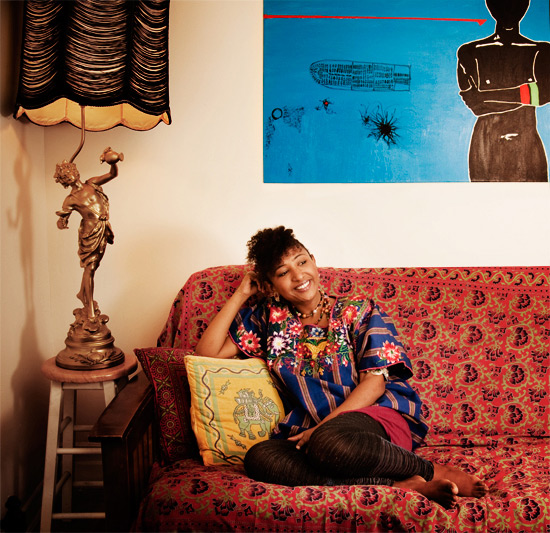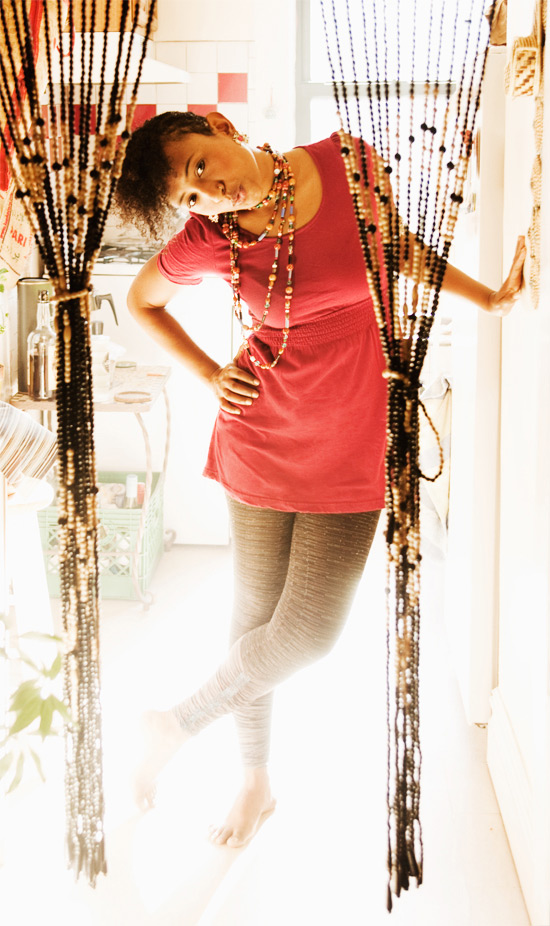
CULTURE | Sudan: Alsarah: Possessed by the Jinn: Women & Music in Sudan
November 2024 / November 2010 | Humanitarian Bazaar Magazine
Singer Alsarah of the Nubatones in New York. Photo by Michael Marquand.
When Sudanese-American singer Alsarah, of the African soul band, The Nubatones, joined HELO for a video interview about her music (Coming soon!), she first offered this interview essay about the connection between Sudanese history, women as performers, forbidden rituals, and the evolution of music in northern Sudan. You can learn more about Alsarah at her website, hear her music, or add her facebook page.
Alsarah portrays the Sudanese music scene based in Khartoum as one which exploded with creativity through ritualistic roots music and new sounds until the coup d’etat in 1989 when leaders imposed a radical conservative government. The change forced many performers out of the country, estranged non-Arabs and non-Muslims, and limited women’s freedom in music culture. Now on the eve of a referendum on whether the country will stay united or the south will become independent, Alsarah suggests music culture might be one major cross-cultural means of healing.
The Arts in Sudan are very much dominated by men, like in many parts of the world. But long ago women were able to forge their way into the professional music world, especially as singers, defying many traditions.
Today there’s a lot of controversy about women being performers in public. It’s practically unheard of outside the realm of traditional women’s music to find female singers who are writing their own music, except for very rare exceptions like Rasha, and she doesn’t live in Sudan anymore. I’ve always found that to be one of the major factors for why I couldn’t relate to Sudanese music when I was younger. I never heard my story in the music.
I remember when I first started singing my own songs as a teenager, a lot of Sudani people, men especially, thought I had a sweet voice but should leave writing to those who are ‘professionals’. I disagree. Everyone has the ability to write their own music because everyone has their own voice. Everyone’s story is worth telling, so why not a woman’s story told through her own voice?
In the north, which is where I lived, if a woman wants to perform traditional Sudanese music like Aghani Banat, she can definitely do it in the female-dominated sphere, wedding ceremonies, for example. It has a price on her ‘honor’ and societal standing. But once one gets to the economics of it, a traditional ghania successful at her art (i.e. she can sing traditional aghani banat, accompany herself on the daluka and teach bridal dancing) in today’s Khartoum can be a very wealthy woman, wealthier than any ‘high brow’ artistic male counterpart.
However, a singer who refuses to wear a headscarf and strays into mixed crowds can be an even bigger taboo, one you need to leave Khartoum altogether to see.
VIDEO
Alsarah singing “Vote!” with Oddisee.
I moved a lot at a young age, from Sudan to Yemen and to the U.S. Relocating to new countries and cultures has made me open to listening to all kinds of new music. When I was younger and living in Yemen, I would randomly buy used tapes of music from different countries across the Middle East. I listened to Algerian music, Yemeni traditional music, Arabic classical music, and other things when I left Sudan. I was in awe of how much music was out there that I never even knew about.
When I arrived to the United States, my mother enrolled me in a performing arts high school. There I was exposed to Appalachian folk music, Balkan women’s choral singing, Jazz and even Indian music. It seemed only natural that I would continue what began as a hobby, in my studies at University. So I studied Ethnomusicology.
Only then did I really begin to listen closely to Sudanese music. Learning about the intense diversity of sounds and rhythms that made up Sudan. From the Waza trumpets to the songs and stories of the Hakama, I realized one of the integral things about the Sudanese sound is its diversity. And it all occurs in sync with some ritual in the society surrounding that music.
When the time came for my senior thesis I wanted to do something that related to Sudanese music. I was really interested in the application of music to religious ceremonies. I read about Zar, a ceremony used to communicate with the spirit realm to heal humans from ailments thought to be caused by spiritual possession. It is a common ideology throughout Africa and most of the world really in one form or another.
What I found to be most fascinating about the Zar in Sudan though are two main things: 1- It’s a spiritual practice passed down matrilineal lines of the family; and 2- Music plays a vital role in the conducting of ceremonies with many showcasing full bands during the ritual made up of several drummers, and singers, sometimes even a keyboard player, all of whom are women. A sharp contrast from the current patriarichal laws and practices of the country at large.
Zar has been illegal in Sudan since 1983 when Nimieri instituted Shari’a law (what I secretly call the beginning of the end). Zar’s considered a sin by a lot of religious leaders because of its founding belief of negotiating with the spirit world, as opposed to banishing any ungodly presence through the reading of the Quran.
Some secular opposition to the practice also exists because of the exorbitant prices charged by some Zar leaders and the financial ramifications of these high cost elaborate rituals on an already poor society where some are unable to see options outside of the traditional ones offered.
The music in Zar rituals is hard to come by on recordings, so I decided to go to Sudan and do my research in Omdurman. I made a connection at the center for Afro-Asian studies at the University of Khartoum graduate center. The psychology department at the university has a lot of interest in the Zar tradition, its ceremonies, and its use of rituals in conjunction with psychotherapy. Some of the professors took me to Omdurman, which besides being the old capital city of Sudan, is also a host to many of the old families still practicing the Zar.
One woman invited me to a few ceremonies. Women came from different parts of the city to participate in what was considered unanimously by those involved to be a healing ceremony. There was a wedding like atmosphere about the house. The woman having the ceremony performed for her had henna on her hands feet like a bride and was locked in a room at first heavily doused in incense to begin inducing trance. All the women who came shared their spiritual possession stories.
The sounds of drums could be heard from sunrise to sunset. They stopped only for prayers five times a day. Like all Sudanese events and rituals a lamb was sacrificed (sometimes other smaller or larger animals were sacrificed instead all depending on economic status of the person funding the ritual, usually the bride’s family).
What fascinated me the most was the musical connection between the Zar and the popular secular music happening elsewhere in the same community. It was similar to, and maybe had roots in the aghani banat style and other traditional music in Sudan. That’s what started my ongoing love affair with Sudanese music until today.
VIDEO
Alsarah singing Aghani Banat at an opening for K’naan.
Prior to the coup of 1989 there were many female singers publicly performing (unveiled) in Sudan (even if they were not writing their own music). El Balabel were the most respected and well known of those. I mention them because they are a rare find, an all female trio who were major stars in ‘high brow’ music. They broke out in the 70s under the musical direction and management of their father and it was considered a huge controversy for him to allow his daughters to perform publicly. After the coup, they like many others, left.
Censorship had become so stifling in Sudan it was practically illegal for music to exist outside a very narrow strip of what was condoned by the government. The signing of the peace agreement allowed for things to relax enough for the three sisters recently to return to Khartoum and have a string of successful concerts (albeit they had to have a light scarf covering their heads).
Due to the Khartoum-centered general culture of Sudan, Khartoum being one of the few places where any services are available to the citizens of Sudan) It was hard for any singers outside of that area to become famous or have their music heard. Notable singers like Mariam Boyi were hardly heard outside of the Southern Sudanese community.
Over the past twenty years music in Sudan has creatively come to a halt. Censorship means an artist can’t express his/her truth. And if art can’t reflect our truth, then its really not art anymore, it is just a craft. Nothing new can be created; people only copy what was already there.
Unlike many other Muslim countries women’s presence in the public sphere was very normal in Sudan before 1989. Since Nimieri’s Sharia law, Sudan has taken drastic steps backwards. This rapid Arabization and Sharia-centered viewpoint is squeezing out everyone else who doesn’t adhere to this ideology.
In the diaspora, the various Sudanese communities never really integrated, sadly. And now with the upcoming referendum I wonder if we ever will. I was lucky enough a year ago to participate in a concert in Boston with a diverse group of young Sudanese artists all creating powerful and original works and we had a chance to talk after the show about the power of making music.
It evens out the playing field and we can all hear one another better when our stories are set to song. Because then it’s about the music first and who the person is second. As cliché as it sounds, music truly heals people. It transcends linguistic barriers, cultural barriers and even hate. It is pure and raw human energy.
As soon as they find out I’m Sudanese (oddly, the first assumpion is that I’m Ethiopian), a lot of people ask me whether I support unity or separation. I wish life was that black and white. I try to put myself in the other seat and wonder ‘if I was from the south would I want to stay with the north or not?’ and to be honest my answer is always no. ‘Why would anyone want to stay united with a country who’s public ideology doesn’t reflect their own?’ I ask myself.
‘Why would I want to stay with a government that continues to treat me like a second class citizen? Why would I want to be one with a country that has yet to issue a public apology for all the atrocities committed against its own people? Why would I want to share equally what is mine with someone who will never admit that they don’t even see me as an equal?’ Then a small loud cry inside of me always explodes back in reply, ‘stay for people like me!!!’
I want a chance to get to know my own people. I know that Sudan can never be all that it can be if we are divided. I want to build a new Sudan for all of the Sudanese people not section it off so we become homogenous fenced off creatures afraid of change and afraid of diversity.

Alsarah. Photo by Michael Marquand.
